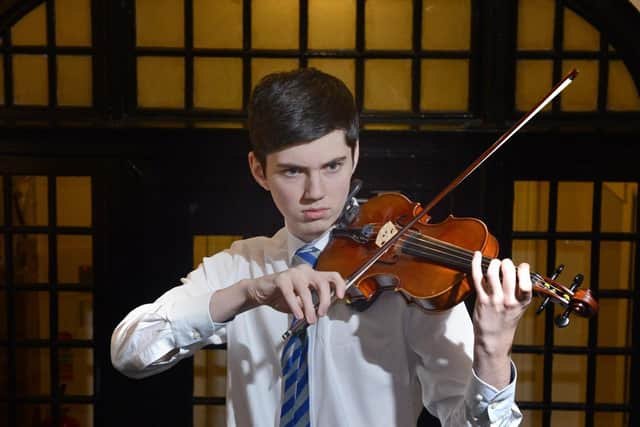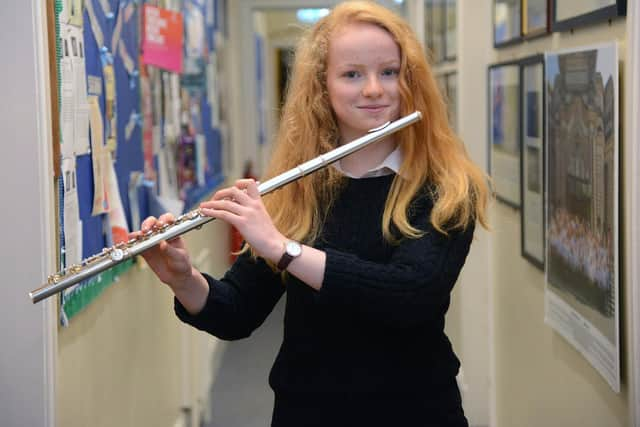Inside Edinburgh's St Mary's, the only independent state-supported music school in Scotland


Schoolchildren across the Lothians are feverishly learning their lines and practising their notes for nativity plays and christmas concerts.
None more so than the 79 pupils of St Mary’s Music School, one of just five Government-supported specialist music schools in the UK and the only one in Scotland.
Advertisement
Hide AdAdvertisement
Hide AdStudents will perform their annual concert, ‘a Christmas Pastorella’, at St Cuthbert’s Church on December 16.


It is just one of a yearly calendar of concerts for the tiny independent, tucked down a sidestreet a few minutes walk from St Mary’s Episcopal Cathedral, whose choristers are pupils at the school.
The former lay clerk’s training college complete with chapel reverberates with the sound of music from first thing in the morning until 10pm at night, when the boarders are asked to stop their practising and get some well-earned rest.
Each pupil has a bespoke timetable, dashing between academic classes, music lessons and dedicated rehearsal time, also squeezing in activities like gardening club, debating society and sports - only those unlikely to cause injury to talented young fingers of course.
Advertisement
Hide AdAdvertisement
Hide AdWith academic class sizes ranging from around 14 to just one or two, and a roll call of music teachers including many of the country’s top musicians, it may be hard to believe this independent school is anything more than a training ground for the super-rich of the city.


But almost all of the students receive some kind of financial support, and 16% pay no fees at all thanks to funding from the Government, which pays 64% of total fees.
“That funding is absolutely essential to the running of the school,” said headmaster Dr Kenneth Taylor.
“It’s what we’re all about, and it means we can offer something to all the highly musical children of Scotland.
Advertisement
Hide AdAdvertisement
Hide Ad“It’s important that if you are a young musician you have the opportunity to encounter music, to become engaged and to develop your talent - the best way to do that is to be immersed in music with like-minded individuals and teachers.”
For Lachlan Kennedy, in S5, the financial support has opened doors to a musical education he would not otherwise have had access to.
The sixteen-year-old used to commute from his family home in Glasgow, but now has ‘much more time for music practise’ as a boarder.
He hopes to continue his dedication to the violin and viola after school.
Advertisement
Hide AdAdvertisement
Hide AdKimberley Archibald is one of very few students who does not wish to pursue further music study after graduation.
Instead she hopes to study chemistry at Edinburgh University before moving on to a PhD in medical research.
Now in S6, she moved to the school two years ago from Peebles High School.
“It’s very different here,” said the seventeen-year-old, who also depends on financial support from the government.
“The funding system is really good,” she added.
Advertisement
Hide AdAdvertisement
Hide Ad“A lot of people at the school wouldn’t be here otherwise, it’s a way for any good musicians to get that chance. There should be more schools like this in Scotland.”
The non-denominational school welcomes children from all backgrounds, and while the majority come from Edinburgh there are pupils from across Scotland and the UK, and several from mainland Europe.
From the art room to the science lab to the well-stocked music library, each classroom doubles as a practice room.
Children are taught to practise ‘mindfully and well’, rather than with mindless repetition, to best use the time they have.
Advertisement
Hide AdAdvertisement
Hide Ad“I have nine hours of practice in my timetable,” said Lachlan.
“But it’s not enough - you always need more!”
Students can hone their performance skills at lunchtime concerts in the chapel, which also houses a Steinway piano purchased following a £100,000 fundraiser.
“We’re very proud to have the Steinway,” said school Marketing Manager Fiona Duncan.
“We did have to fundraise for it though - it’s amazing how much we spend on our pianos, with 44 at the school the tuning bill alone comes to £7,000 or £8,000 a year.”
Advertisement
Hide AdAdvertisement
Hide AdProfessional musicians and former pupils also play in the chapel concerts, including pianist Steven Osborne who gave a recent recital.
“It’s amazing to see people of that level play,” said Lachlan.
Mr Osbourne was taught by Richard Beauchamp, Head of Keyboard until his semi-retirement in 2014.
His wife Ruth continues to teach cello, after 27 years at the school.